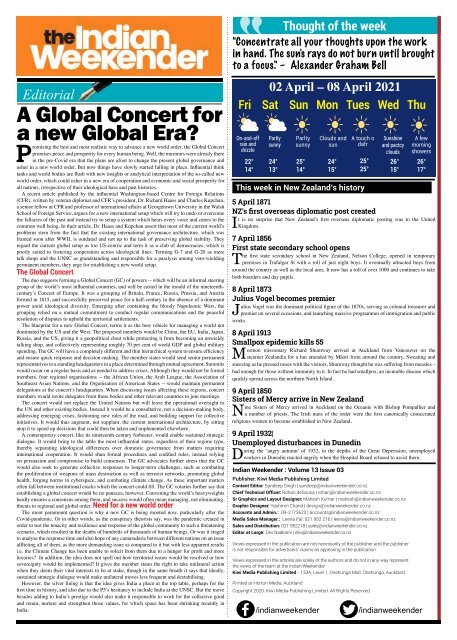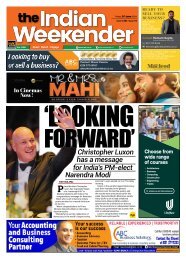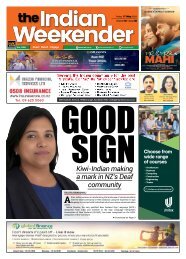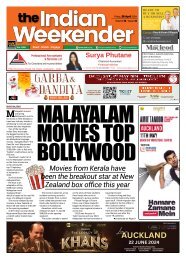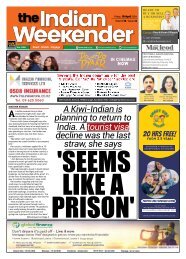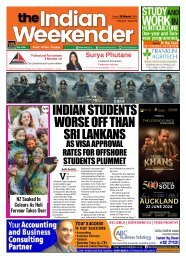The Indian Weekender, 2 April 2021
Weekly Kiwi-Indian publication printed and distributed free every Friday in Auckland, New Zealand
Weekly Kiwi-Indian publication printed and distributed free every Friday in Auckland, New Zealand
Create successful ePaper yourself
Turn your PDF publications into a flip-book with our unique Google optimized e-Paper software.
Editorial<br />
A Global Concert for<br />
a new Global Era?<br />
Promising the best and most realistic way to advance a new world order, the Global Concert<br />
promises peace and prosperity for every human being. Well, the murmurs were already there<br />
in the pre-Covid era that the plans are afoot to change the present global governance and<br />
usher in a new world order. But now things have slowly started falling in place. Influential think<br />
tanks and world bodies are flush with new insights or analytical interpretation of the so-called new<br />
world order, which could usher in a new era of cooperation and economic and social prosperity for<br />
all nations, irrespective of their ideological base and past histories.<br />
A recent article published by the influential Washington-based Centre for Foreign Relations<br />
(CFR), written by veteran diplomat and CFR’s president, Dr. Richard Haass and Charles Kupchan,<br />
a senior fellow at CFR and professor of international affairs at Georgetown University in the Walsh<br />
School of Foreign Service, argues for a new international setup which will try to undo or overcome<br />
the fallacies of the past and instead try to setup a system which hears every voice and caters to the<br />
common well being. In their article, Dr. Haass and Kupchan assert that most of the current world’s<br />
problems stem from the fact that the existing international governance architecture, which was<br />
framed soon after WWII, is outdated and not up to the task of preserving global stability. <strong>The</strong>y<br />
regard the current global setup as too US-centric and term it as a club of democracies, which is<br />
poorly suited to fostering cooperation across ideological lines. Terming G-7 and G-20 as mere<br />
talk shops and the UNSC as grandstanding and responsible for a paralysis among veto-wielding<br />
permanent members, they urge for establishing a new world setup.<br />
<strong>The</strong> Global Concert<br />
<strong>The</strong> duo suggests forming a Global Concert (GC) of powers -- which will be an informal steering<br />
group of the world’s most influential countries, and will be casted in the mould of the nineteenthcentury’s<br />
Concert of Europe. It was a grouping of Britain, France, Russia, Prussia, and Austria<br />
formed in 1815, and successfully preserved peace for a half-century in the absence of a dominant<br />
power amid ideological diversity. Emerging after containing the bloody Napoleonic Wars, the<br />
grouping relied on a mutual commitment to conduct regular communications and the peaceful<br />
resolution of disputes to uphold the territorial settlements.<br />
<strong>The</strong> blueprint for a new Global Concert, terms it as the best vehicle for managing a world not<br />
dominated by the US and the West. <strong>The</strong> proposed members would be China, the EU, India, Japan,<br />
Russia, and the US, giving it a geopolitical clout while protecting it from becoming an unwieldy<br />
talking shop, and collectively representing roughly 70 per cent of world GDP and global military<br />
spending. <strong>The</strong> GC will have a completely different and thin hierarchical system to ensure efficiency<br />
and ensure quick response and decision-making. <strong>The</strong> member states would send senior permanent<br />
representatives to a standing headquarters in a place determined through mutual agreement. Summits<br />
would occur on a regular basis and as needed to address crises. Although they would not be formal<br />
members, four regional organisations -- the African Union, the Arab League, the Association of<br />
Southeast Asian Nations, and the Organisation of American States -- would maintain permanent<br />
delegations at the concert’s headquarters. When discussing issues affecting these regions, concert<br />
members would invite delegates from these bodies and other relevant countries to join meetings.<br />
<strong>The</strong> concert would not replace the United Nations but will leave the operational oversight to<br />
the UN and other existing bodies. Instead it would be a consultative, not a decision-making body,<br />
addressing emerging crises, fashioning new rules of the road, and building support for collective<br />
initiatives. It would thus augment, not supplant, the current international architecture, by sitting<br />
atop it to speed up decisions that could then be taken and implemented elsewhere.<br />
A contemporary concert, like its nineteenth-century forbearer, would enable sustained strategic<br />
dialogue. It would bring to the table the most influential states, regardless of their regime type,<br />
thereby separating ideological differences over domestic governance from matters requiring<br />
international cooperation. It would shun formal procedures and codified rules, instead relying<br />
on persuasion and compromise to build consensus. <strong>The</strong> GC advocates further stress that the GC<br />
would also seek to generate collective responses to longer-term challenges, such as combating<br />
the proliferation of weapons of mass destruction as well as terrorist networks, promoting global<br />
health, forging norms in cyberspace, and combating climate change. As these important matters<br />
often fall between institutional cracks which the concert could fill. <strong>The</strong> GC votaries further say that<br />
establishing a global concert would be no panacea, however. Convening the world’s heavyweights<br />
hardly ensures a consensus among them, and success would often mean managing, not eliminating,<br />
threats to regional and global order. Need for a new world order<br />
<strong>The</strong> moot paramount question is why a new GC is being mooted now, particularly after the<br />
Covid-pandemic. Or in other words, as the conspiracy theorists say, was the pandemic created in<br />
order to test the tenacity and resilience and response of the global community to such a threatening<br />
scenario, which resulted in the deaths of hundreds of thousands of human beings. Or was it staged<br />
to analyse the response time and also hope of any camaraderie between different nations on an issue<br />
afflicting all of them, as the more demanding issue as compared to it but with less apparent results<br />
i.e. the Climate Change has been unable to solicit from them due to a hunger for profit and more<br />
luxuries? In addition, the idea does not spell out how territorial issues would be resolved or how<br />
sovereignty would be implemented? It gives the member states the right to take unilateral action<br />
when they deem their vital interests to be at stake, though in the same breath it says that ideally,<br />
sustained strategic dialogue would make unilateral moves less frequent and destabilising.<br />
However, the silver lining is that the idea gives India a place at the top table, perhaps for the<br />
first time in history, and also due to the P5’s hesitancy to include India at the UNSC. But the move<br />
besides adding to India’s prestige would also make it responsible to work for the collective good<br />
and retain, nurture and strengthen those values, for which space has been shrinking recently in<br />
India.<br />
Thought of the week<br />
"Concentrate all your thoughts upon the work<br />
in hand. <strong>The</strong> sun's rays do not burn until brought<br />
to a focus." – Alexander Graham Bell<br />
<strong>Indian</strong> <strong>Weekender</strong> : Volume 13 Issue 03<br />
Publisher: Kiwi Media Publishing Limited<br />
Content Editor: Sandeep Singh | sandeep@indianweekender.co.nz<br />
Chief Technical Officer: Rohan deSouza | rohan@indianweekender.co.nz<br />
Sr Graphics and Layout Designer: Mahesh Kumar | mahesh@indianweekender.co.nz<br />
Graphic Designer: Yashmin Chand | design@indianweekender.co.nz<br />
Accounts and Admin.: 09-2173623 | accounts@indianweekender.co.nz<br />
Media Sales Manager.: Leena Pal: 021 952 216 | leena@indianweekender.co.nz<br />
Sales and Distribution: 021 952218 | sales@indianweekender.co.nz<br />
Editor at Large: Dev Nadkarni | dev@indianweekender.co.nz<br />
Views expressed in the publication are not necessarily of the publisher and the publisher<br />
is not responsible for advertisers’ claims as appearing in the publication<br />
Views expressed in the articles are solely of the authors and do not in any way represent<br />
the views of the team at the <strong>Indian</strong> <strong>Weekender</strong><br />
Kiwi Media Publishing Limited - 133A, Level 1, Onehunga Mall, Onehunga, Auckland.<br />
Printed at Horton Media, Auckland<br />
02 <strong>April</strong> – 08 <strong>April</strong> <strong>2021</strong><br />
Fri Sat Sun Mon Tues Wed Thu<br />
On-and-off<br />
rain and<br />
drizzle<br />
22°<br />
14°<br />
Partly<br />
sunny<br />
24°<br />
13°<br />
Parlty<br />
sunny<br />
25°<br />
14°<br />
Clouds and<br />
sun<br />
24°<br />
15°<br />
A touch o<br />
dafr<br />
This week in New Zealand’s history<br />
25°<br />
25°<br />
5 <strong>April</strong> 1871<br />
NZ's first overseas diplomatic post created<br />
Copyright 2020. Kiwi Media Publishing Limited. All Rights Reserved.<br />
Sunshine<br />
and pactcy<br />
clouds<br />
26°<br />
15°<br />
A few<br />
morning<br />
showers<br />
26°<br />
17°<br />
It is no surprise that New Zealand’s first overseas diplomatic posting was to the United<br />
Kingdom.<br />
7 <strong>April</strong> 1856<br />
First state secondary school opens<br />
<strong>The</strong> first state secondary school in New Zealand, Nelson College, opened in temporary<br />
premises in Trafalgar St with a roll of just eight boys. It eventually attracted boys from<br />
around the country as well as the local area. It now has a roll of over 1000 and continues to take<br />
both boarders and day pupils.<br />
8 <strong>April</strong> 1873<br />
Julius Vogel becomes premier<br />
Julius Vogel was the dominant political figure of the 1870s, serving as colonial treasurer and<br />
premier on several occasions, and launching massive programmes of immigration and public<br />
works.<br />
8 <strong>April</strong> 1913<br />
Smallpox epidemic kills 55<br />
Mormon missionary Richard Shumway arrived at Auckland from Vancouver on the<br />
steamer Zealandia for a hui attended by Māori from around the country. Sweating and<br />
sneezing as he pressed noses with the visitors, Shumway thought he was suffering from measles –<br />
bad enough for those without immunity to it. In fact he had smallpox, an incurable disease which<br />
quickly spread across the northern North Island.<br />
9 <strong>April</strong> 1850<br />
Sisters of Mercy arrive in New Zealand<br />
Nine Sisters of Mercy arrived in Auckland on the Oceanie with Bishop Pompallier and<br />
a number of priests. <strong>The</strong> Irish nuns of the order were the first canonically consecrated<br />
religious women to become established in New Zealand.<br />
9 <strong>April</strong> 1932|<br />
Unemployed disturbances in Dunedin<br />
During the ‘angry autumn’ of 1932, in the depths of the Great Depression, unemployed<br />
workers in Dunedin reacted angrily when the Hospital Board refused to assist them.


